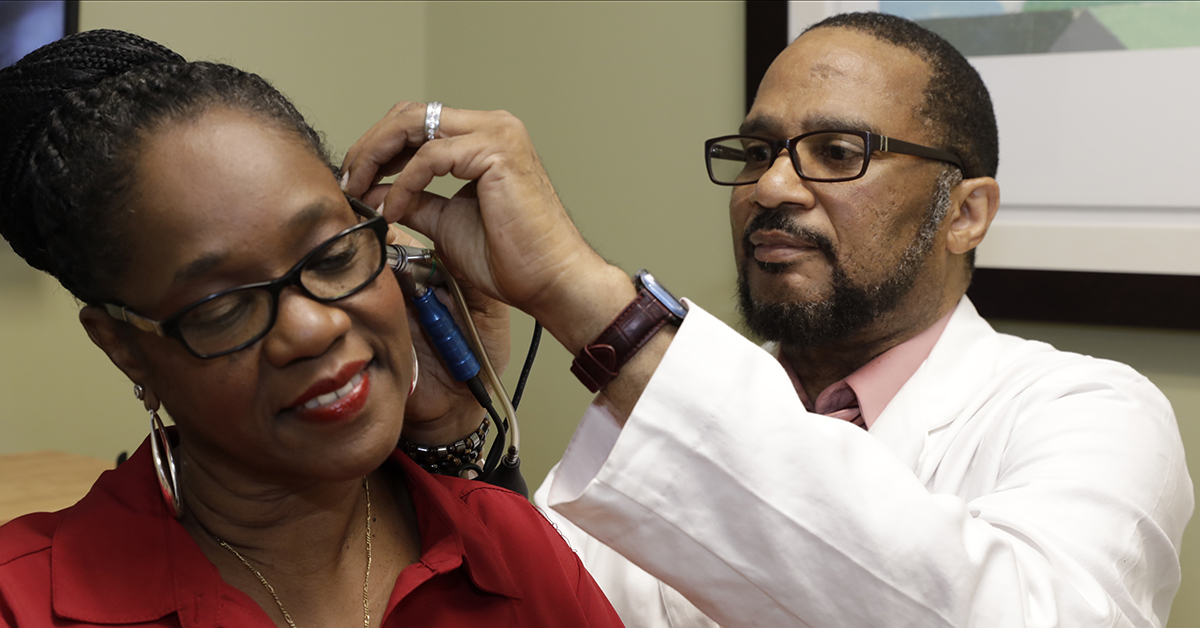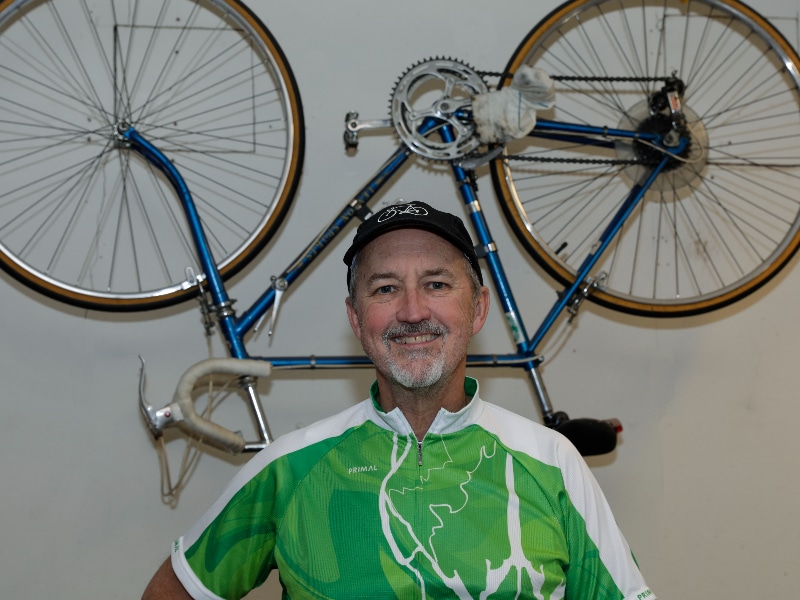Michael Young had no warning or history of heart problems when he suffered a cardiac arrest at his Cedar Hill hearing-aid office a year ago
“My heart completely stopped for 30 minutes,” says Michael, who would need an advanced pacemaker and defibrillator to correct his irregular heartbeat. “This was out of the blue.”
But the 64-year-old survived thanks to a colleague who knew CPR and the cardiology team at Methodist Charlton Medical Center.
“The staff was excellent,” he says. “They were like my guardian angels.”
At the time, however, the odds for a full recovery seemed stacked against this “miracle man,” as Michael came to be known by patients and staff on several floors at Methodist Charlton.
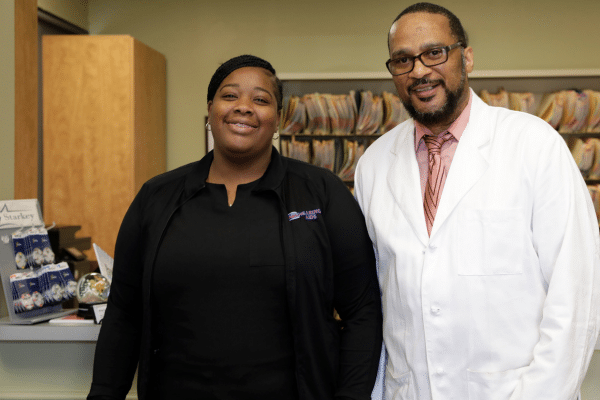
Joy Washington performed CPR when Michael collapsed at the hearing-aid center where they work.
CPR SAVES LIVES
On the day his heart stopped, Michael was joking around with his co-workers at the hearing-aid center.
“They said I just fell out and started changing colors,” he says of that day shortly before New Year’s in 2022. “After that, I was out of it until Jan. 4.”
Fortunately, his co-worker Joy Washington knew CPR, and she kept his blood flowing until paramedics arrived and took over.
“That immediate care kept the blood flowing to my brain,” Michael says. “That CPR saved my life.”
But Michael would need more guardian angels once the ambulance delivered him to Methodist Charlton, including a familiar face at his bedside.
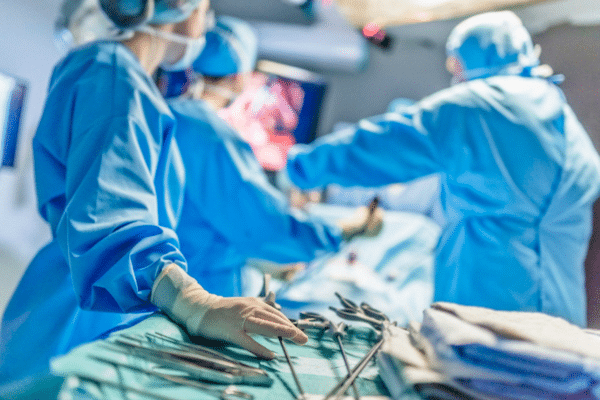
The cardiac cath lab at Methodist Charlton was ready for Michael when he arrived.
‘PRESSURE WAS ON’
When Michael’s wife, Tina, arrived at the hospital, a chaplain escorted her upstairs and told her that her husband was alive, but his condition was grave after his cardiac arrest.
“This guy is strong,” she remembers the chaplain saying, “but he’s fighting for his life.”
Tina’s mother had heart problems, including bypass surgery in 2015, so she remained calm, trusting in the staff at Methodist Charlton. That faith was quickly reinforced when she saw who would be leading her husband’s care.
“Would you believe the same doctor who cared for my mother’s heart for so many years walked out?” she says, recounting the moment she saw Michael’s physician.
William Posligua, MD, cardiologist on the medical staff at Methodist Charlton, recognized Tina as well, and he soon realized the stakes of living up to her expectations.
“These hands fixed my mother’s heart,” she told Dr. Posligua. “Now they’ve got another project: to fix my husband.”
Tina’s relief inspired some anxiety on the doctor’s part.
“The pressure was on because, yes, I helped her mom,” Dr. Posligua recalls. “But Michael was brutally sick. Even so, I knew we could not fail her.”
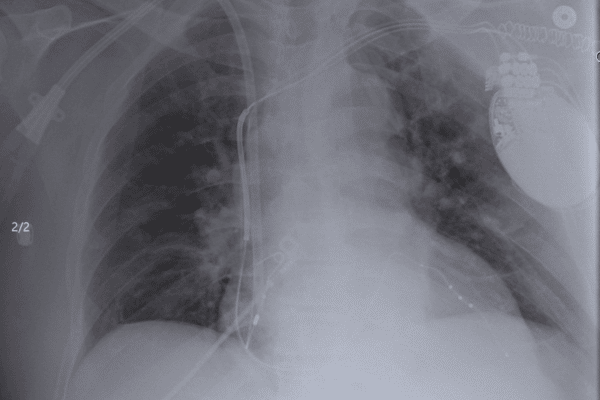
A specialized device coupling a pacemaker and a defribillator got Michael’s heart back in sync.
ELECTRICAL ISSUE
Michael’s heart condition was different from many of the patients that Dr. Posligua treats because his arteries were not blocked.
“The condition we detected was an electrical issue rather than a plumbing issue,” he says. “He did not require any stents or open-heart surgery.”
Instead, Michael had severe heart failure as a result of a “left bundle branch block,” a disruption in the heart’s electrical pathways that causes the left ventricle to contract later than it should.
“Over time, that weakened the heart muscle because it was out of sync,” Dr. Posligua says.
An advanced pacemaker could resynchronize Michael’s heart, but stabilizing him would come first, and that would require temporarily implanting an Impella CP heart pump. Placed through his femoral artery into the left side of his heart, the pump would support his heart through the initial days of his hospitalization and help him recover from cardiogenic shock and respiratory failure.
“It’s really a miracle,” Dr. Posligua says. “We were just a part of this, but he really survived cardiac arrest where most people in his condition won’t. Kudos to whoever performed CPR because that helped him a lot.”
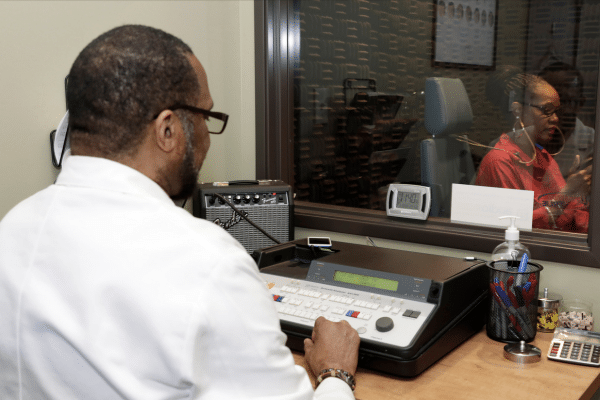
Michael, with his wife, Tina, returned to work after a few months of cardiac rehabilitation.
BACK TO NORMAL AFTER CARDIAC ARREST
Michael also suffered kidney failure, a common complication for patients whose hearts stop and deprive their organs of blood. Once again, Tina knew her husband was in the right hands.
“The same young lady who worked on his kidneys was also my mother’s doctor,” she says of Lisa Sebastian, MD, nephrologist on the medical staff at Methodist Charlton.
A third doctor — David Levine, MD, electrophysiologist on the medical staff at Methodist Charlton — would implant Michael’s biventricular ICD, a small battery-operated device that combines a pacemaker to resynchronize the patient’s heartbeat and a defibrillator that keeps the heart from beating too fast.
Now, after a few months of cardiac rehabilitation, Michael is back at work as a state-licensed hearing instrument specialist, helping patients of his own.
He and his wife credit his recovery from cardiac arrest to all of his guardian angels, from his co-worker Joy to his doctors and nurses to the rehabilitation staff who helped him walk out of the hospital on his own.
“I’m thankful for the entire team at Methodist Charlton and the rehab hospital,” he says. “They’re the ones who helped me put one foot in front of the other.”

